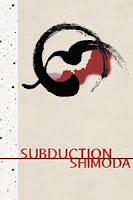 Author: Todd Shimoda
Author: Todd Shimoda
Illustrator: L. J. C. Shimoda
Publisher: Chin Music Press
ISBN: 9780984457670
Released: May 2012
Subduction, a novel written by Todd Shimoda with artwork by L. J. C. Shimoda, was published by Chin Music Press in 2012. Todd Shimoda is an American author who lived for at time in Japan and who frequently includes Japanese themes in his works. L. J. C. Shimoda is a book designer and artist who also happens to be Todd Shimoda’s wife. The two have collaborated on several other novels together including Oh! A Mystery of Mono no Aware (also published by Chin Music Press), The Fourth Treasure, and 365 Views of Mt. Fuji. Before reading Subduction I wasn’t familiar with their work although it does seem to be well received by readers and critics. I was happy when Chin Music Press sent me a review copy of Subduction for review so that I could experience the Shimodas’ work for myself. I’ve read a couple of Chin Music Press’ nonfiction publications, but Subduction is the first novel from the publisher that I’ve had the opportunity to read. I continue to be impressed by the physical quality and beautiful design of the books from Chin Music Press.
Jun Endo was a young doctor completing his residency in Tokyo when one of his patients dies unexpectedly. He is blamed for her death and ultimately as a result he is sent to the remote island of Marui-jima to serve as the doctor for its aging population. The small island is plagued by earthquakes. Due to the increase in seismic activity the Japanese government tried to evacuate its community but a small number of older residents have refused to leave. They’re not too happy with Dr. Endo’s presence on Marui-jima, either. Only two other outsiders currently live on the island: Aki Ishikawa, a seismologist who hopes to develop an early warning system for earthquakes, and Mari Sasaki, a documentary filmmaker who is collecting the stories of Marui-jima and its people. Aki and Mari are also the only people even close to Endo’s age. The rural, secluded Marui-jima is a far cry from the urban, crowded Tokyo. Unless there is a disaster, Endo is destined to remain in the unwelcoming environment for four years.
L. J. C. Shimoda’s artwork is a lovely addition to Subduction. I liked it quite a bit. The pieces are largely abstract with a heavy influence from Asian calligraphy traditions. She occasionally includes portions of photographs in her artwork, creating a simple collage-like effect. At first I didn’t consider Shimoda’s art to be an integral part of Subduction, but after finishing the novel I came to realize that it added a layer to an already layered story and that it helped to establish the overall mood and tone. Without the artwork, Subduction would have been an entirely different book. Also included in Subduction is a retelling of the myth “Kishima and the Giant Catfish.” I found its placement to be a little strange—it interrupts a chapter partway through—but it’s a wonderful tale. Shimoda changes her art style for this section of the book, using more color and taking inspiration from traditional woodblock prints associated with the story.
I mentioned that the story of Subduction is a layered one. Once Endo arrives at Marui-jima, the residents’ stories begin to overtake his own. He slowly learns more about those living on the island, but he doesn’t come any closer to really understanding any of them. Tragic events from forty years ago continue to have profound consequences on the island’s community. Aki, Mari, and Endo all bring their own demons with them, too. The intersections of people’s pasts and personalities as they come up against those of others create fault lines in their relationships that are just as dangerous as Marui-jima’s. The atmosphere of Subduction is vaguely ominous as Endo is confronted with the fact that he is unwanted. The older residents form an insular community and they are willing to protect it in any way necessary. I found Subduction to be a very intriguing novel with some suspenseful twists. Based on Subduction, I’d certainly be interested in reading more of the Shimodas’ work.
Thank you to Chin Music Press for providing a copy of Subduction for review.

Speak Your Mind